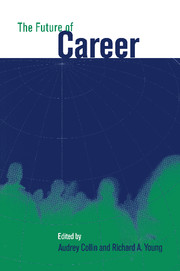Book contents
- Frontmatter
- Contents
- Notes on contributors
- Acknowledgements
- 1 Introduction: framing the future of career
- Part 1 Changing contexts
- Part 2 New perspectives
- 7 The future of boundaryless careers
- 8 Career development in a changing context of the second part of working life
- 9 The future of women's career
- 10 Career or slide? Managing on the threshold of sense
- 11 Epic and novel: the rhetoric of career
- Part 3 New directions for theory, practice and policy
- Author index
- Subject index
7 - The future of boundaryless careers
Published online by Cambridge University Press: 06 January 2010
- Frontmatter
- Contents
- Notes on contributors
- Acknowledgements
- 1 Introduction: framing the future of career
- Part 1 Changing contexts
- Part 2 New perspectives
- 7 The future of boundaryless careers
- 8 Career development in a changing context of the second part of working life
- 9 The future of women's career
- 10 Career or slide? Managing on the threshold of sense
- 11 Epic and novel: the rhetoric of career
- Part 3 New directions for theory, practice and policy
- Author index
- Subject index
Summary
When massive economic restructuring forced William H. Whyte Jr's (1956) ‘organization man’ to walk permanently out of the front doors of the corporation, many of the assumptions of a traditional career path followed shortly behind. In the wake of his departure, people were left pondering how they would survive without a job for life, a corporate ‘road map’ to guide their destiny and the firm's hierarchy to define their status or place in society. Without employers’ orderly structures, external guides for action, and linear career paths, however, just what is the future of career? When ‘the career’ devolves to the level of the individual does free agency prevail and a form of ‘career anarchy’ result? Is there anything that can be concluded about careers if everyone seems to be doing their own thing?
We argue here that the answer is an emphatic ‘yes’. The new environment suggests a shift from pre-ordained and linear development to perpetually changing career paths and possibilities. As a result a shift from ‘bounded’ careers – prescribed by relatively stable organisational and occupational structures – to ‘boundaryless’ careers – where uncertainty and flexibility are the order of the day – is increasingly common. The concept of the boundaryless career is broadly based, and intended to reflect the emergent pace of economic change. It does not characterise any single career form, but rather ‘a range of possible forms that defy traditional employment assumptions’ (Arthur & Rousseau, 1996, p. 6).
The myriad interactions of a boundaryless career over a lifetime of work experiences can appear overwhelming. A complex web of relationships emerges from numerous exchanges among individuals, teams, and employers. The interplay may seem downright chaotic.
- Type
- Chapter
- Information
- The Future of Career , pp. 101 - 114Publisher: Cambridge University PressPrint publication year: 2000
- 47
- Cited by

